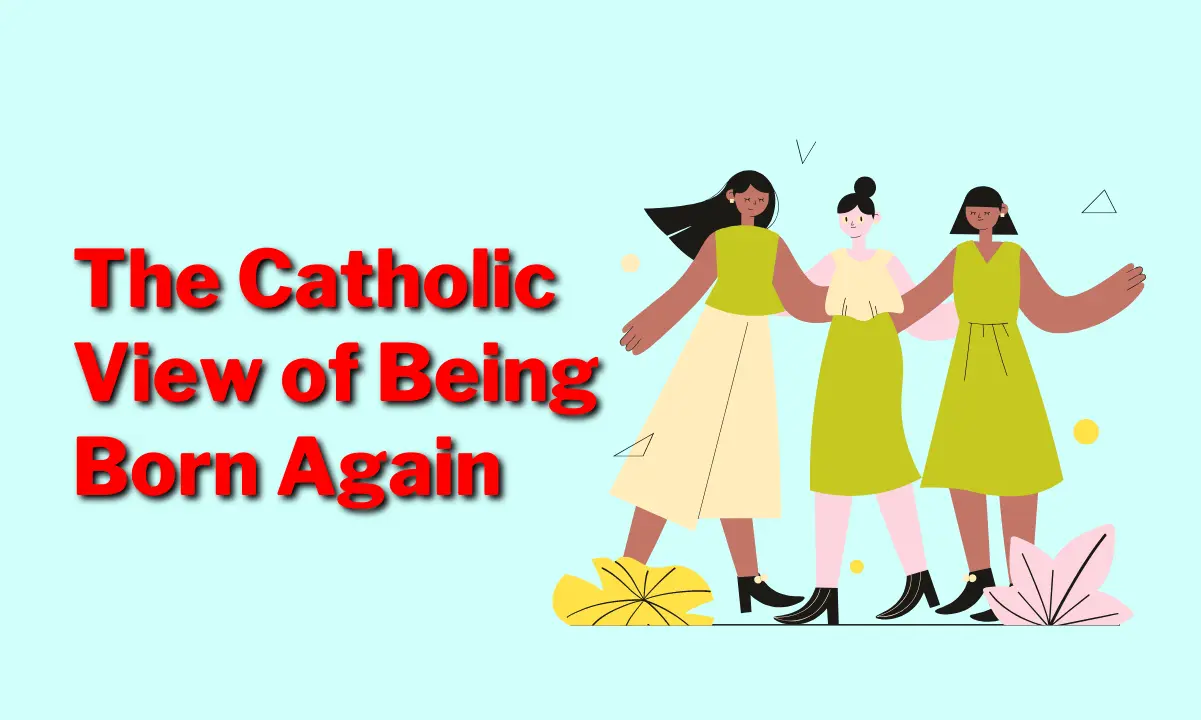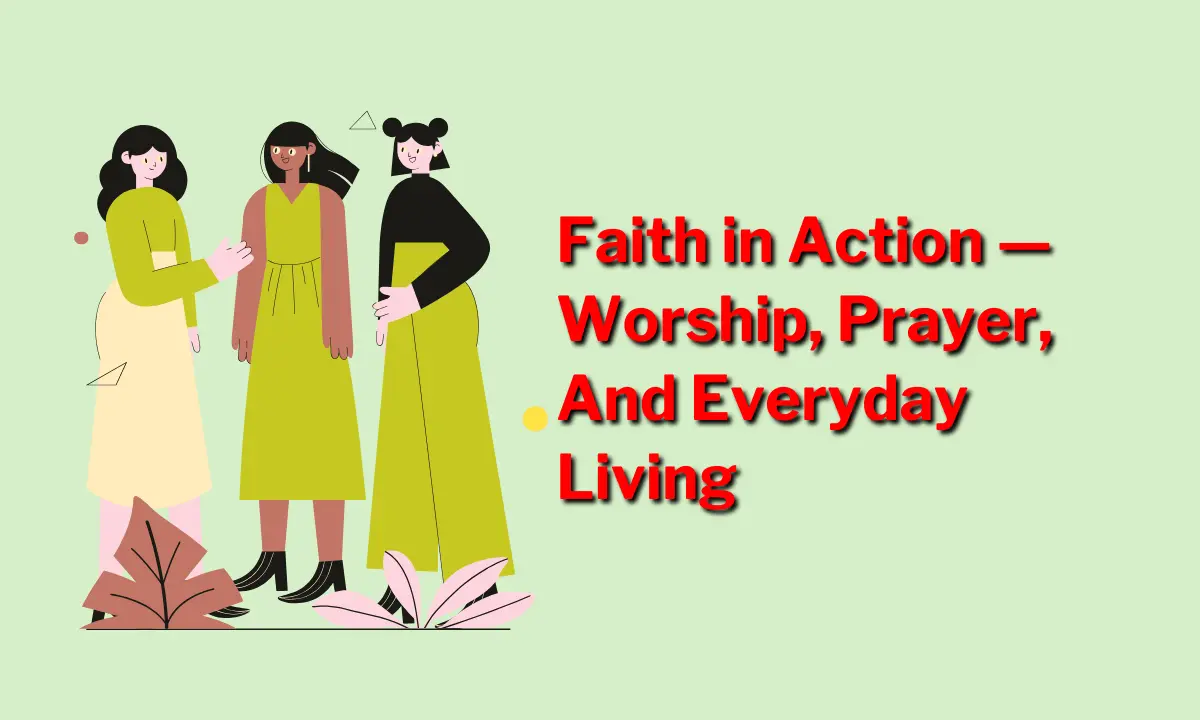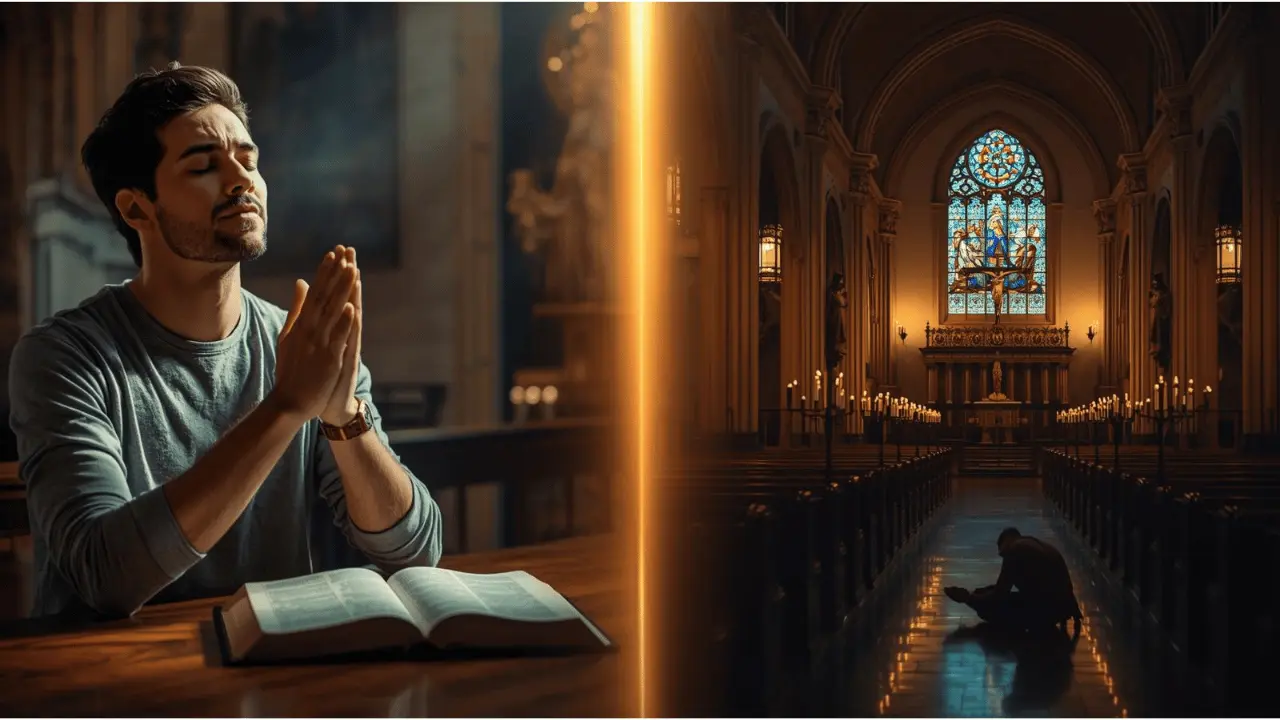Many assume Catholics and “born-again” Christians stand on opposite sides — one rooted in tradition, the other in passion. But when we look more closely at Scripture and history, we discover something deeper.
Both cherish Jesus, pray sincerely, and long to walk with God. Their expressions differ — one through sacraments, the other through personal rebirth — yet both seek the same grace and the same Savior.
This is not about who is right or wrong. It is an invitation to understand how two paths can lead to the same cross.
The Meaning of Being Born Again in Christianity
The phrase “born again” is not a modern idea or a piece of church jargon. It comes directly from the words of Jesus Himself:
“Unless someone is born again, he can not see the kingdom of God.” — John 3:3
For Christians, being born again refers to a spiritual rebirth — a deep, inner transformation that occurs when a person personally accepts Jesus Christ as their Lord and Savior.
This renewal is often marked by:
- A sincere repentance and turning away from sin
- Receiving forgiveness through the sacrifice of Christ
- Beginning a new life empowered by the Holy Spirit
- Developing a personal and living relationship with God
It is not about joining a religion or following a set of rituals. It is about a changed heart and a brand-new start. Many believers describe this moment as the first time they truly felt spiritually alive.
The Catholic View of Being Born Again

Catholics also believe in spiritual rebirth, but they understand it in close connection with the sacrament of baptism. They view baptism as the moment when a person is cleansed and reborn in the grace of God.
“He saved us through the washing of rebirth and renewal by the Holy Spirit.” — Titus 3:5
For Catholics, baptism is not merely symbolic. It is a sacred act of grace that marks the beginning of a lifelong relationship with God. From that moment forward, faith deepens through participation in the Church, prayer, and the other sacraments.
While Born Again Christians see rebirth as a personal spiritual awakening that occurs through faith, Catholics understand it as a sacramental beginning — one that starts with baptism and continues through ongoing spiritual growth.
Both perspectives affirm the importance of spiritual rebirth; they simply differ in where they believe that new life begins.
Differences: Salvation, Grace & Faith
| Topic | Born Again Belief | Catholic Belief |
|---|---|---|
| How salvation starts | Faith in Jesus alone through personal repentance | Faith in Jesus + grace through the Church’s sacraments |
| Key belief | “Saved by grace through faith” (Ephesians 2:8–9) | Grace received through faith and works done in love (James 2:17) |
| Assurance | Salvation is certain through trusting Christ | Salvation continues through confession, obedience, and sacraments |
Born Again Christians emphasize a personal moment of conversion — when someone consciously accepts Christ and receives eternal life by grace alone.
Catholics emphasize faith supported by ongoing participation in the life of the Church — viewing salvation as both an event and a journey.
- Born Again Christians often say, “I am saved.”
- Catholics would say, “I am being saved.”
Faith and Works: Friends, Not Enemies
For many centuries, this has been one of the biggest theological debates.
- Born Again Christians believe that good works are the natural fruit of salvation, not the cause.
- Catholics, on the other hand, believe that faith and works cooperate — faith gives life to works, and works express faith’s authenticity.
As James 2:17 reminds us:
“Faith by itself, if it does not have works, is dead.”
Both perspectives agree on this truth:
Real faith produces real transformation.
If faith does not change how we live, it is not genuine.
Worship, Prayer, and Daily Life

The Born Again Christian Lifestyle: In most Born Again communities, worship and prayer are heartfelt expressions of love and devotion to God through Jesus Christ. This relationship is deeply personal and goes far beyond weekly church services. It becomes part of daily life, shaping how believers think, make choices, and interact with others.
Common practices :
- Reading and studying the Bible each day, allowing God’s Word to guide their hearts and decisions.
- Praying directly to God in the name of Jesus, offering praise, seeking guidance, and sharing personal struggles and gratitude.
- Taking part in fellowship and evangelism, encouraging one another in faith and reaching out to others with the message of hope found in Christ.
- Worshiping through singing, testimonies, and teaching, creating an atmosphere of joy, reflection, and spiritual renewal.
For Born Again Christians, faith is not just a belief system but a way of living. They seek to know Jesus intimately, trusting Him as Savior and walking with Him as a faithful friend. Through prayer, Scripture, and community, they grow closer to God and strive to reflect His love in everyday life.
The Catholic Lifestyle and Devotion: Catholic life also centres on a deep devotion to Jesus Christ, enriched by centuries of sacred tradition and sacramental practice. Faith is expressed not only through personal belief but also through participation in the life of the Church and the rhythms of worship that have been passed down through generations.
- Regular participation in Mass and receiving the Eucharist, which is regarded as the heart of Christian worship and communion with Christ.
- Confession, prayer, and acts of charity, which nurture spiritual growth and reflect God’s mercy and love toward others.
- Prayer with the saints and Mary, seeking their intercession and guidance as fellow members of God’s family.
- Reading and reflecting on Scripture alongside Church tradition, understanding God’s Word within the wisdom of the faith handed down through the ages.
Born Again and Catholic Prayer Differences
Born Again prayer is offered directly to God through Jesus Christ alone, reflecting a personal and direct relationship with Him.
Catholic prayer may include asking Mary or the saints to intercede, not as worship, but as a request for their prayers and support before God.
Both seek the same goal — a closer relationship with God — but express it through different paths shaped by faith and tradition.
Baptism & Religious Practices
| Topic | Born Again | Catholic |
|---|---|---|
| Infant Baptism | Not practiced — baptism follows personal faith | Practiced as entry into God’s covenant family |
| Meaning | Public declaration of faith | Sacrament of spiritual rebirth |
| Symbol or Sacrament? | Symbolic of inward change | Sacrament that imparts grace |
For Born Again Christians, baptism is an outward sign of inward faith — something done after one believes.
For Catholics, baptism is the means of grace that brings a person into God’s family from infancy.
Both see baptism as essential — but they differ on when and how it conveys new life.
Can You Be Both Born Again and Catholic?
Yes — and many do. Many Catholics describe powerful moments of renewal that they understand as being “born again,” often during retreats, prayer meetings, or times of deep reflection.
For them, this experience is an awakening — a personal encounter with Jesus Christ that makes faith feel alive and deeply real. It brings a renewed love for God and a stronger desire to live according to His will.
Being born again does not take Catholics away from their Church. Instead, it deepens their faith, strengthens their devotion to the sacraments, and draws them closer to Christ within the heart of Catholic life.
What Do Catholics Think of Born Again Christians?
Misunderstandings exist on both sides, often shaped more by stereotypes than by truth.
Common misconceptions about Catholics:
- “They worship Mary or the saints.”
→ In reality, Catholics honor them as faithful examples who lead believers closer to Christ. Worship is reserved for God alone.
Common misconceptions about Born Again Christians:
- “They ignore church history.”
→ Most Born Again believers respect the history and traditions of the Church but place strong emphasis on the authority of Scripture and a personal relationship with God.
At the heart of both faiths is the same desire — to know, love, and follow Jesus Christ.
What Both Agree On
Shared Beliefs: Both Born Again Christians and Catholics believe in Jesus Christ as Lord and Savior, trust the Bible as God’s inspired Word, and understand salvation as a gift of grace. They also affirm the Holy Spirit’s power to renew and transform lives.
Living Out the Faith: Both agree that true faith must produce love, holiness, and service. Though their traditions differ, they share the same desire — to live under Christ’s Lordship and reflect His love in everyday life.
For deeper study, you can explore BibleGateway.com to read the verses mentioned in different translations or visit Vatican.va for the Catholic Catechism’s teachings on faith and grace.
People Also Ask
Can a Catholic be a Born Again Christian?
Yes. Catholics believe they are “born again” through baptism, which imparts new spiritual life. Many Catholics also experience personal renewal later in life — similar to what evangelicals describe as being born again.
What does it mean to be a Born Again Christian?
Being “born again” means experiencing spiritual rebirth through faith in Jesus Christ. It is a transformation of the heart, marked by repentance, acceptance of Christ, and a new life guided by the Holy Spirit.
What’s the difference between Born Again and Catholic beliefs?
Born Again Christians emphasize personal faith and salvation by grace alone. Catholics agree salvation is by grace but view it as a lifelong journey nurtured through sacraments, faith, and good works.
Do Catholics believe in salvation through faith alone?
Catholics teach that salvation begins with faith and grace, but must be lived out through love, repentance, and obedience to God — not faith alone, but faith made alive through action.
Is being “born again” mentioned in the Bible?
Yes. The term comes from John 3:3, where Jesus tells Nicodemus that one must be “born again” to see the Kingdom of God. Both Catholics and Protestants interpret this verse as essential to Christian life, though in different ways.


1 thought on “Born Again Christian vs Catholic: What the Bible Really Says”